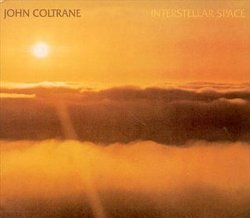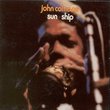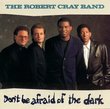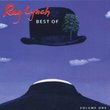| All Artists: John Coltrane Title: Interstellar Space Members Wishing: 3 Total Copies: 0 Label: Polygram Records Release Date: 6/6/2000 Album Type: Original recording remastered Genres: Jazz, Pop Style: Avant Garde & Free Jazz Number of Discs: 1 SwapaCD Credits: 1 UPC: 731454341523 |
Search - John Coltrane :: Interstellar Space
 | John Coltrane Interstellar Space Genres: Jazz, Pop
John Coltrane's last recordings have a concentrated intensity and a pointed focus that give them the authority of a final testament. On Interstellar Space, recorded in February 1967 just a few months before his death, C... more » |
Larger Image |
CD DetailsSynopsis
Amazon.com John Coltrane's last recordings have a concentrated intensity and a pointed focus that give them the authority of a final testament. On Interstellar Space, recorded in February 1967 just a few months before his death, Coltrane reduced the idea of the group to its absolute minimum, a duo with drummer Rashied Ali. Without the fixed harmonic frame of reference provided by piano or bass, Coltrane takes each of his brief themes and submits it to extended testing--repeating, contracting, and expanding phrases until they melt into a new inspiration. These are performances of extraordinary technical achievement. Coltrane ranges over the tenor with a vibrato so tight it sounds like it might contort the horn, exploring incremental shifts in pitch and tone and bending notes from one register to another. But it's a virtuosity that may well go unnoticed amid the sheer passion of his work and the unknown goal toward which every improvisation moves. It's visionary music, filled with expressive necessity and the full tumult of life, embarking on journeys that are as apt to begin in serenity as end there. Rashied Ali matches Coltrane here as well as Elvin Jones had earlier in the decade, using continuous rolls and cymbal details to create a polyrhythmic backdrop that's filled with subtle, responsive shifts in accents. It's clearly all the support that Coltrane required. --Stuart Broomer Similar CDs
Similarly Requested CDs
|
CD ReviewsColtrane's Experimental Peak Avernus | Weatherford, TX, USA | 12/13/2007 (5 out of 5 stars) "To begin, I am very new to the wonderful world of jazz. I had been introduced to free-jazz almost a year ago with Miles Davis' "Bitches Brew," but had been relatively unimpressed, writing it off as directionless and dull. It wasn't until I recently purchased another Davis classic, "Some Kind of Blue," that I fully appreciated "Bitches Brew" and decided to begin a cool-jazz, free-jazz and hard-bop collection. Although I am relatively new to jazz, I have a extremely diverse collection of progressive rock, art rock, and avant-garde albums so I am used to unconventional music, in which "Interstellar Space" definitely applies. Understanding my musical taste is vital in comparing the relevance of my review to your own preferences. I came across "Interstellar Space" at an illogical point in my discovery of jazz music. I was just getting over my initial astonishment at Coltrane's brilliant release, "Blue Train," and was substantially thirsting for more 'Trane. Though I knew enough about "Interstellar Space" to understand that this would not be another "Blue Train," I really had no idea what I was spending 15 bucks on. Expecting this album to be anything remotely similar to "Bitches Brew" proved to be a mistake, and had I no experience in avant-garde music, I would have never gotten past even the first track ("Mars") of "Interstellar Space." Upon first experience this album, the listener is assaulted with almost utter cacophony consisting of Rashid Ali's frantic, polyrhythmic percussion and John Coltrane's largely atonal, experimental, and ultra-complex alto sax attack. There are no strolling bass lines and absolutely no other accompaniment of any kind. I initially found the first two or three tracks utterly unlistenable and was just about to set "Interstellar Space" aside in utter frustration when my ears subtly began to recover from the realization that this nothing like the conventional "Blue Train," nor the multi-layered "Bitches Brew." John Coltrane obviously had no interest whatsoever in creating an album based around a tonal center, or even the acknowledgment of a steady meter when recording "Interstellar Space." Coltrane's bombardment of mostly twelve-tone scales hardly differ from track to track in tempo and ultimate spontaneity, so it is most effective to think of this album as one long track divided into parts. Most "parts" are largely arranged in a similar fashion, beginning with either Coltrane shaking bells, a theme-like melody, or both, with five-plus minutes of improvisation and Ali providing a dazzling drum solo towards the end. The emphasis on "Interstellar Space" is ultimately the intensity of the music, and the sheer technical proficiency. While this may sound dull, I find it absolutely intriguing. While it may prove difficult to overlook than the lack of a tonal center and steady meter, the patient listener will be graciously rewarded with a stunning tour de force. There are moments on this album when Coltrane is playing so quickly and ferociously that it seems the music is due to combust into broken shards, yet it never does. Coltrane manages to keep the listener vividly awake and efficiently succumbed to the hypnotic, raw power of "Interstellar Space." The tremendous impact of this album could have not been as stunning without Ali at the skins. While maybe not quite the virtuosi that Elvin Jones was, the tension created between Ali and Coltrane is absolutely perfect. While Ali does not seem to acknowledge a steady meter, there is a sort of pattern in his performance. Rather of keeping the arrangements together, Ali follows Coltrane in his attempt to tear them apart. Ali carefully matches Coltrane in intensity, tempo (though it is mostly consistent), and more importantly, color! I have yet to hear a drummer who can attain as much a melodic feel as Ali has on this recording. This album is ultimately kept vividly alive with the imaginative interplay between Coltrane and Ali. Not only do both manage to keep things interesting and tense, but they keep the arrangements monstrously complicated. The most prominent characteristics of "Interstellar Space," are interestingly, contradictions. The effective simplicity of the duo and its lack of meter or melody, and the technical complexity of the performance are, in effect, delightful foils. This contrast works in the album's favor, providing little to no distractions from its overall intensity. As I become more and more familiar with the works of John Coltrane, I cannot help but think that this album is Coltrane in his experimental prime. Coltrane's free will and "flow-of-conscience" improvisation style that have ultimately become his trademark, are the most prominent characteristics in "Interstellar Space." This album seems like the apex that Coltrane had ultimately been hinting at throughout the evolution of his career. While there are definitely more instantly gratifying Coltrane albums in circulation, "Interstellar Space" is something the adventurous listener will want to check into, wether in appreciation of its unconventionality, complexity, or sheer intensity. " Not for the faint of heart Dawoud Kringle | New York City | 03/02/2008 (5 out of 5 stars) "The thing I get from this recording is that it is pure expression. It is what happens when you dive head first into the spaces between the notes, and go beyond the dialectic of style, genre, music theory, etc. Coltrane, unlike most who attempt such heculean feats, was not searching franticly with this (despite the intensity of much of the recording). He knew exactly what he was doing. The realm beyond was, for him, familiar territory where he felt at home.
It can certainly be a challenge to listen to. But its worth it." |

 Track Listings (6) - Disc #1
Track Listings (6) - Disc #1










